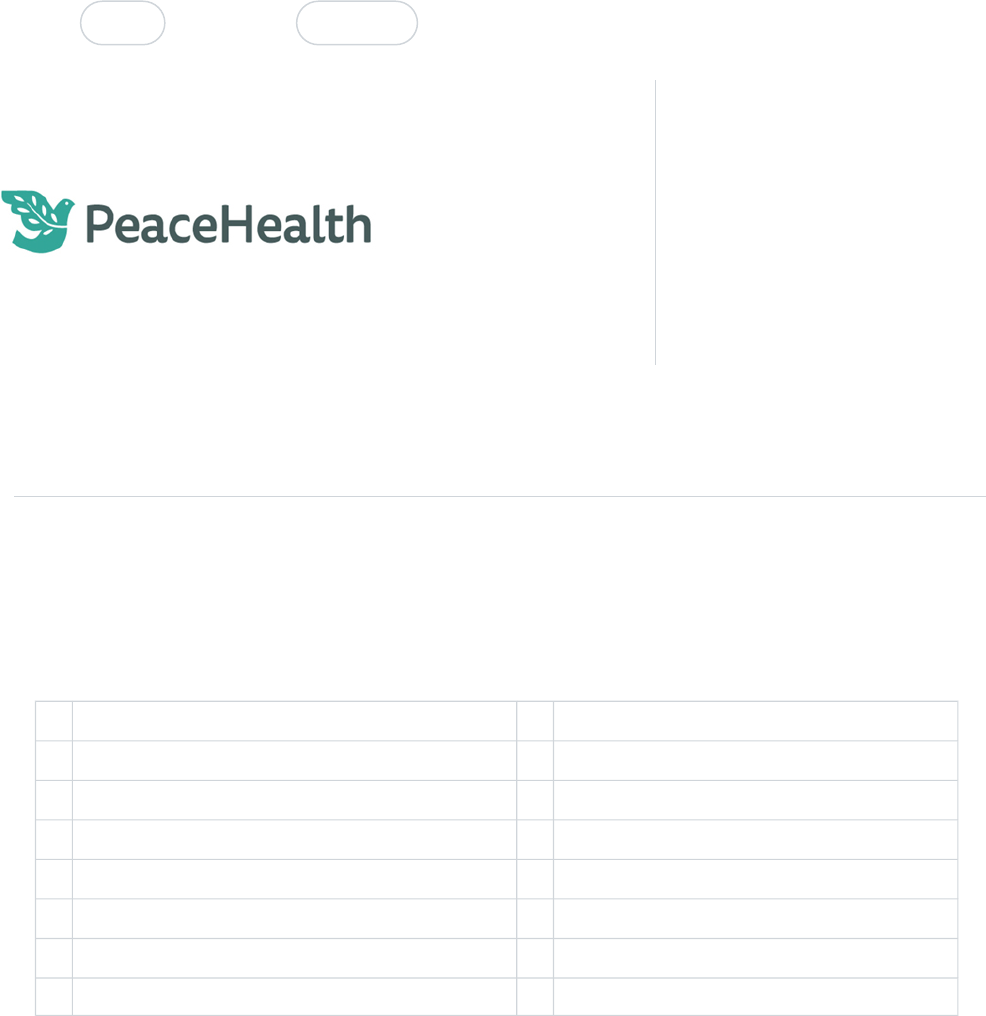
Status
Active
PolicyStat ID
14835878
Origination 10/14/2015 Owner
Hilary Walker:
Last 11/17/2023
Approved
Mgr Advance
Care Planning
Effective 12/15/2023
Area
Administration
Applicability
PeaceHealth
Systemwide
Tags
Policy
Advance Directives Policy
SCOPE
This policy applies to all PeaceHealth settings and services in the location(s) checked below:
Ambulatory Surgery Center PeaceHealth Medical Group
Cottage Grove Medical Center Sacred Heart RiverBend
Ketchikan Medical Center Southwest Medical Center
Ketchikan Long Term Care St. J ohn Medical Center
Peace Harbor Medical Center St. J oseph Medical Center
Peace Island Medical Center System Services Center
PeaceHealth Home & Community United General Medical Center
PeaceHealth Laboratories
PURPOSE
The purpose of this policy is to:
• Provide care consistent with the mission and values of PeaceHealth, in recognition of the
intrinsic worth and inherent dignity of those for whom we provide care.
• Ensure our patients are able to provide guidance to their loved ones, physicians, and
Caregivers, regarding their wishes for healthcare treatments in the future, should they be
unable to make these decisions for themselves.
• Ensure the implementation of the Federal Patient Self-Determination Act (PSDA) of 1991,
affirming a competent patient's right to make decisions about their healthcare, to accept or
Advance Directives Policy. Retrieved 7/24/2024. Official copy at http://peacehealth-system-services.policystat.com/policy/
14835878/. Copyright © 2024 PeaceHealth System Services
Page 1 of 3
refuse medical treatment, and to complete an advance healthcare directive.
• Offer education and assistance to patients and the public in the documentation of their
preferences for medical treatment; including their right to accept or refuse treatment; and
• Ensure PeaceHealth is in compliance with state laws and regulatory body standards regarding
formulation, documentation, and implementation of advance directives.
DEFINITIONS
•
Advance Directives:
A voluntary formal document written in advance which provides direction
to the health care team when an adult Patient loses decisional capacity. Living Wills, Directives
to Physicians, Durable Power of Attorney for Healthcare, are all forms of advance directives.
•
Caregiver:
An employee of PeaceHealth.
•
Directive to Physicians:
A Living Will or Health Directive used in Alaska, Washington and
Oregon.
•
Healthcare Representative:
A person appointed by the patient in a Durable Power of Attorney
document to make decisions for the patient when they lose decisional capacity.
•
Patient:
Both the patient and/or the patient's legal personal representative.
•
Surrogate Decision-Maker:
A patient's legal decision-maker according to the laws of the State
where the patient is receiving medical care. Generally, the order is as follows: (varies by state.
please see state specific hierarchy on ACP team crossroads page)
◦
Legal Guardian appointed by the Courts
◦
Durable Power of Attorney for Health Care
◦
Legal Spouse
◦
Adult children over the age of 18
◦
Parents
◦
Adult siblings over the age of 18
◦
Please see your state laws for specifics, i.e. majority vs. unanimous consent within
groups where there is more than one member, etc.
POLICY
It is the policy of PeaceHealth, that in keeping with our mission and values, PeaceHealth supports
patients and their surrogates right to participate in healthcare decision making and advance care
planning. PeaceHealth offers assistance in formulating and documenting advance directives per
Patient's wishes and ensures those wishes and directives are followed in accordance with standard
medical practice and state and federal law.
• In the event a caregiver is unable to comply with a Patient's advance directives for legal,
religious or cultural reasons, they must inform the patient (or surrogate) and arrange for
transfer of care as per federal and state law.
• Formulation of advance directives is entirely voluntary, and a Patient with decisional capacity
may change or revoke an advance directive at any time, verbally or in writing. All PeaceHealth
medical centers and clinics have procedures for the implementation of this policy within their
Advance Directives Policy. Retrieved 7/24/2024. Official copy at http://peacehealth-system-services.policystat.com/policy/
14835878/. Copyright © 2024 PeaceHealth System Services
Page 2 of 3

facilities.
• Note: Alaska, Washington and Oregon state law requires Advanced Directives to be witnessed
by two people or an acknowledgment by a notary public. See PeaceHealth Witness/Notary
Policy.
• In the event a patient has not completed advance directives naming a healthcare
representative; state law designating the order of legal decision-makers will be followed. See
State Hierarchies on ACP crossroads page.
• In the event the patient has completed an Advanced Directive but does not have it with them,
there is a process for follow up reflected in the procedure.
HELP
Further information may be obtained by contacting the Advance Care Planning team
RELATED MATERIAL
Policies & Procedures:
• Advance Directives for Patient Access in CareConnect
• Witnessing and Notarizing Medical Advance Directives Policy
Laws & Regulations:
• Patient Self-Determination Act of 1991
• RCW 70.122 Natural Death Act
• RCW 70.122.030 Directive to Withhold or Withdraw Life Sustaining Treatment
• RCW 11.94 Power of Attorney
• ORS 127
• Alaska:
◦
AS 13.52.010 et seq.
◦
AS 12.65.007
◦
7 ACC 16.010
• 42 U.S.C. §300a-7 (d)
Advance Directives Policy. Retrieved 7/24/2024. Official copy at http://peacehealth-system-services.policystat.com/policy/
1835878/. Copyright © 2024 PeaceHealth System Services
Page 3 of 3

Status
Active
PolicyStat ID
15012312
Origination 12/1/1992 Owner
Erica Torres: Sys
Last 7/16/2024
Approved
VP Mission
Integration
Effective 7/16/2024
Area
Mission Services
Applicability
PeaceHealth
Systemwide
Tags
Policy and
Procedure
Physician Assisted Suicide Policy
SCOPE
This policy and procedure applies to all PeaceHealth settings and services in the location(s) checked
below:
Ambulatory Surgery Center PeaceHealth Medical Group
Cottage Grove Medical Center Sacred Heart RiverBend
Ketchikan Medical Center Southwest Medical Center
Ketchikan Long Term Care St. J ohn Medical Center
Peace Harbor Medical Center St. J oseph Medical Center
Peace Island Medical Center System Services Center
PeaceHealth Home & Community United General Medical Center
PeaceHealth Laboratories
PURPOSE
The purpose of this policy and procedure is to provide the requirements for appropriate support of dying
persons and families while respecting PeaceHealth's position as set forth in its policy.
DEFINITIONS
•
Death with Dignity:
Defined under Oregon and Washington State laws, as when a terminally ill,
informed adult voluntarily chooses to obtain a physician prescription for drugs to end his or
her life and
self-administers
the drugs, thereby hastening his or her death following
Physician Assisted Suicide Policy. Retrieved 7/24/2024. Official copy at http://peacehealth-system-services.policystat.com/
policy/15012312/. Copyright © 2024 PeaceHealth System Services
Page 1 of 3
confirmation of a prognosis of dying in less than six (6) months. Prior to receiving this
prescription, a patient must have a second physician's opinion regarding their terminal
diagnosis, make an oral and a written request, and reiterate the oral request to his or her
attending physician no less than seven (7) days after making the initial oral request. The
patient must also have counseling if either physician believes the patient has a mental
disorder, or impaired judgment from depression, and be cleared of these by the person
providing the counseling. Patients also have the choice whether to notify next of kin or not.
Health care providers are immune from civil and criminal liability for good faith compliance.
•
PeaceHealth's Statement of Common Values:
A document curated by PeaceHealth's Board of
Directors which identifies PeaceHealth as a Catholic health system and offers ethical guidance
to be followed by any and all who conduct patient care and/or business on behalf of
PeaceHealth.
•
Physician Assisted Suicide:
A volitional choice – deemed wrong according to the moral
teachings of the Roman Catholic Church – to hasten one's death via the self-administration of
lethal medication obtained from a physician which directly causes one's death.
POLICY
As a Catholic health system, PeaceHealth does not promote or participate in physician assisted suicide
(PAS, known by some as Death with Dignity or DWD). (See PeaceHealth's Statement of Common Values)
Patients wanting information on PAS should consult their provider.
OVERVIEW
According to PeaceHealth's Statement of Common Values, "Any act done with the explicit intent of
ending a patient's life may not be performed in PeaceHealth owned or leased facilities. A patient's
decision to refrain from aggressive or curative treatment will be respected, even when such a decision
may result in the person's death. Medicines capable of relieving pain and suffering may be given to a
person even if such therapy may indirectly shorten the person's life."
PROCEDURE
1. Make an initial determination that a patient has a terminal disease and inform the patient of
the medical prognosis.
Providers, pharmacists, and other Caregivers may not provide drugs that allow patients to end
their own lives in PeaceHealth facilities or as an employee of or an independent contractor
with PeaceHealth.
2. Patients voicing an interest in pursuing PAS should be asked about the reasons for their
interest to determine if modalities offered by PeaceHealth may help, and receive a palliative
care consult, a spiritual care consult, a hospice eligibility intake assessment, and/or
information from their provider about relevant community resources as appropriate.
3. Patients pursuing PAS independently who are also hospice eligible may be admitted to a
PeaceHealth hospice program with the intent of receiving hospice care consistent with
PeaceHealth's mission and values.
4. Patients in the hospital voicing an interest in pursuing PAS who are not hospice eligible should
Physician Assisted Suicide Policy. Retrieved 7/24/2024. Official copy at http://peacehealth-system-services.policystat.com/
policy/15012312/. Copyright © 2024 PeaceHealth System Services
Page 2 of 3

receive a palliative care consult, a referral for spiritual care, and/or information from their
provider about relevant community resources as appropriate.
5. Provide the patient with information about appropriate and allowable end-of-life resources as
well as the link to the Washington Death with Dignity Act website or similar websites in other
states with DWD or similar laws upon the request of the patient.
6. Providers should enter a chart note with the smartphrase, .firstoralrequest, which states:
“@name@ has made a first oral request today to pursue the option of obtaining life-ending
medications for self-administration under applicable state Death with Dignity statutes. I
provided resources for end-of-life support (palliative care, hospice, online resources for Death
with Dignity) excluding medication prescribed with the intention of helping patient end their
own life.”
7. While PeaceHealth does not restrict freedom of provider speech, providers may not use
facilities or medical records to aid in DWD requests.
8. In home hospice settings, Caregivers may not provide life ending medications or be in the
patient’s room when they ingest life-ending medications. However, after ingestion, Caregivers
may provide nursing, spiritual, social, and other supports as needed.
9. All normal support services for the family, including bereavement coordination should be
provided to the family when and where applicable.
10. PeaceHealth caregivers or providers with conscience objections should follow the process
outlined in the Objections of Conscience Policy.
HELP
Further gudiance may be obtained by contacting Mission Services.
REFERENCES
• Oregon Health Authority, https://www.oregon.gov/oha/ph/providerpartnerresources/
evaluationresearch/deathwithdignityact/pages/index.aspx
• Washington State Department of Health, https://www.doh.wa.gov/youandyourfamily/
illnessanddisease/deathwithdignityact
• Ethical and Religious Directives for Catholic Health Care Services (ERDs), 6th Edition, United
States Conference of Catholic Bishops. 2018.
Physician Assisted Suicide Policy. Retrieved 7/24/2024. Official copy at http://peacehealth-system-services.policystat.com/
policy/15012312/. Copyright © 2024 PeaceHealth System Services
Page 3 of 3

Status
Active
PolicyStat ID
14889519
Origination 6/8/2020 Owner
Erica Torres: Sys
Last 12/12/2022
Approved
VP Mission
Integration
Effective 12/15/2023
Area
Mission Services
Applicability
PeaceHealth
Systemwide
Tags
Policy and
Procedure
Voluntarily Stopping Eating and Drinking Policy
SCOPE
This policy applies to all PeaceHealth settings and services in the location(s) checked below:
Ambulatory Surgery Center PeaceHealth Medical Group
Cottage Grove Medical Center Sacred Heart RiverBend
Ketchikan Medical Center Southwest Medical Center
Ketchikan Long Term Care St. J ohn Medical Center
Peace Harbor Medical Center St. J oseph Medical Center
Peace Island Medical Center System Services Center
PeaceHealth Home & Community United General Medical Center
PeaceHealth Laboratories
PURPOSE
The purpose of this policy is to clarify the PeaceHealth position on "voluntarily stopping eating and
drinking" (aka VSED).
DEFINITIONS
•
Ethical and Religious Directives for Catholic Health Care Services (ERDs):
A document
published by the United States Conference of Catholic Bishops that provides ethical and
religious guidance to be followed by any and all Catholic healthcare systems wishing to
maintain a Catholic identity.
Voluntarily Stopping Eating and Drinking Policy. Retrieved 7/24/2024. Official copy at http://peacehealth-system-
services.policystat.com/policy/14889519/. Copyright © 2024 PeaceHealth System Services
Page 1 of 3

•
Voluntarily Stopping Eating and Drinking
: A volitional choice – deemed wrong according to the
moral teachings of the Roman Catholic Church – to refuse oral food and fluids for the purpose
of hastening death via the process of terminal dehydration.
POLICY
As a Catholic health system, PeaceHealth does not promote or participate in voluntarily stopping eating
and drinking (VSED) to hasten death. (See ERDs 58 and 60.) Patients wanting information on VSED
should consult their provider.
OVERVIEW
VSED is a volitional choice – deemed wrong according to the moral teachings of the Roman Catholic
Church – to refuse oral food and fluids for the purpose of hastening death via the process of terminal
dehydration. VSED is distinct from the withdrawal of burdensome medical treatment (such as a feeding
tube) or deciding to stop eating and drinking due to an inability to receive oral food and fluids because of
burdens related to a medical condition. Individuals who successfully complete VSED die from
dehydration brought on by the voluntary choice to refuse to take oral food and fluids. Individuals deciding
to pursue VSED may or may not have a terminal medical condition. As a Catholic health system,
PeaceHealth understands the intake of oral food and fluids under normal circumstances to be ordinary
or proportionate means of preserving human life. (See ERD 56.) Exceptions to this may occur when in
the judgment of the patient (or their health care representative) the intake of oral food and fluid
themselves become excessively burdensome
due to an underlying medical condition
. (See ERDs 57 and
58.)
PROCEDURE
1. Patients voicing an interest in pursuing VSED should be asked about the reasons for their
interest in VSED to determine if modalities offered by PeaceHealth may help, and receive a
palliative care consult, a spiritual care consult, a hospice eligibility intake assessment, and/or
information from their provider about relevant community resources as appropriate.
2. Patients pursuing VSED independently who are also hospice eligible may be admitted to a
PeaceHealth hospice program with the intent of receiving hospice care consistent with
PeaceHealth's mission and values.
3. Patients in the hospital voicing an interest in pursuing VSED who are not hospice eligible
should receive a palliative care consult, a referral for spiritual care, and/or information from
their provider about relevant community resources as appropriate.
4. PeaceHealth caregivers or providers with conscience objections should follow the process
outlined in the
Objections of Conscience Policy
.
HELP
Further information may be obtained by contacting Mission Services by phone at (360) 729-1295, or the
System Director of Hospice and Palliative Care at (360) 729-1681.
Voluntarily Stopping Eating and Drinking Policy. Retrieved 7/24/2024. Official copy at http://peacehealth-system-
services.policystat.com/policy/14889519/. Copyright © 2024 PeaceHealth System Services
Page 2 of 3

REFERENCES
• United States Conference of Catholic Bishops, Ethical and Religious Directives for Catholic
Health Care Services.
• J ansen, I.A., & Sulmasy, D.P. (2002). "Sedation, alimentation, hydration, and equivocation:
Careful conversation about care at end of life." Annals of Internal Medicine, 136, 845-849.
Voluntarily Stopping Eating and Drinking Policy. Retrieved 7/24/2024. Official copy at http://peacehealth-system-
services.policystat.com/policy/14889519/. Copyright © 2024 PeaceHealth System Services
Page 3 of 3
